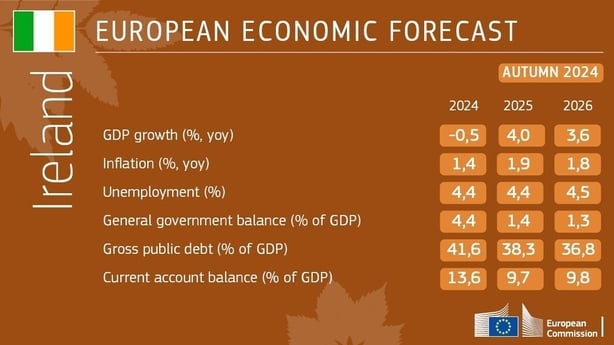Ireland's GDP is expected to decline by 0.5% in 2024, mainly due to a contraction in the multinational sector in the first half of the year, the European Commission's Autumn 2024 Economic Forecast has predicted.
But the Commission said that economic activity is projected to rebound with growth of 4% in 2025 and 3.6% in 2026 supported by a strong labour market, low headline inflation and favourable external environment.
It also said that headline inflation is set to remain low over the forecast horizon with a rate of 1.4% pencilled in for this year and 1.9% for next year.
Meanwhile, unemployment is set to remain steady up to 2025 with a jobless rate of 4.4% predicted for both this year and next, and a slight increase to 4.5% in 2026.

The Commission also said that public finances here are forecast to normalise after further positive surprises in revenues and strong increases in expenditure.
After a prolonged period of stagnation, the Commission said that the EU economy is returning to modest growth, while the disinflation process continues.
The European Commission's Autumn Forecast projects GDP growth in 2024 at 0.9% in the EU and 0.8% in the euro area.
Economic activity is forecast to accelerate to 1.5% in the EU and to 1.3% in the euro area in 2025, and to 1.8% in the EU and 1.6% in the euro area in 2026.
Headline inflation in the euro area is set to more than halve in 2024, from 5.4% in 2023 to 2.4%, before easing more gradually to 2.1% in 2025 and 1.9% in 2026.
In the EU, the disinflation process is projected to be even sharper in 2024, with headline inflation falling to 2.6%, from 6.4% in 2023, and to continue easing to 2.4% in 2025 and 2.0% in 2026.
The EU also said today that the German economy will continue to significantly underperform average growth in the euro zone until 2026.
The European Commission's Autumn Forecast projects a 0.1% GDP contraction for Germany, a downward revision from growth of 0.1% in the previous forecasts.
"High uncertainty has been weighing on consumption and investment, and the trade outlook has worsened as global demand for industrial goods weakened," the EU said in its report.
Germany, the world's third-largest economy, has lagged the European Union average since 2021 and is expected to shrink for the second year running in 2024, making it the worst performer among the Group of Seven rich democracies.
Commission says outlook subject to growing 'uncertainty and downside risks'
But the commission also warned today that its outlook was subjected to growing "uncertainty and downside risks" linked to an ever-tenser geopolitical context, with Russia's war in Ukraine and conflicts in the Middle East continuing to imperil stability and energy security.
While not cited directly, Donald Trump's imminent return to the White House following his US presidential election victory this month also loomed large on the EU's economic prospects, it suggested.
"A further increase in protectionist measures by trading partners could upend global trade, weighing on the EU's highly open economy," the commission said.
Trump repeatedly professed his love for tariffs on the campaign trail, threatening to target the European Union in particular.
That could trigger a damaging trade war between the US and Europe, with economists warning that even 10% tariffs could hit European economic output.
"On the domestic front, policy uncertainty and structural challenges in the manufacturing sector could entail further losses of competitiveness and weigh on growth and the labour market," the commission said.
Germany is to hold early elections in February after a political crisis, as manufacturers, particularly in the automotive sector, have been hit hard by rising competition in key market China, especially on electric cars.

